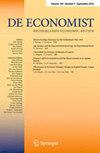关于宏观经济学,我们知道什么是费雪和维克塞尔所不知道的
IF 2.3
4区 经济学
Q2 ECONOMICS
引用次数: 226
摘要
标题中问题的答案是:很多。在本文中,我认为20世纪宏观经济学的历史可以分为三个时期:1940年以前;一段探索时期,宏观经济学还不是宏观经济学,一边是货币理论,另一边是经济周期理论。在这段时间里,所有正确的成分,甚至更多的成分,都被开发出来了。但也是一个混乱的时期,因为缺乏一个完整的框架。1940年到1980年。巩固时期。在此期间,从IS-LM开始开发了一个综合框架,一直到动态一般均衡模型,并用于阐明波动中的冲击和传播机制的作用。但这种建筑有一个致命的弱点,即对不完美的处理过于随意,导致了20世纪70年代末的危机。自1980年以来。一个新的探索时期,集中于宏观经济学中不完善的作用,从名义价格设定的相关性到市场的不完全性,到不对称信息,到分散市场中的搜索和讨价还价。探索常常让人感到困惑。但在它的背后,可能是宏观经济学研究最富有成效的时期之一。本文章由计算机程序翻译,如有差异,请以英文原文为准。
What do we know about Macroeconomics that Fisher and Wicksell did not
The answer to the question in the title is: A lot. In this essay, I argue that the history of macroeconomics during the 20th century can be divided in three epochs: Pre 1940. A period of exploration, where macroeconomics was not macroeconomics yet, but monetary theory on one side, business cycle theory on the other. A period during which all the right ingredients, and quite a few more, were developed. But also a period where confusion reigned, because of the lack of an integrated framework. From 1940 to 1980. A period of consolidation. A period during which an integrated framework was developed starting with the IS-LM, all the way to dynamic general equilibrium models and used to clarify the role of shocks and propagation mechanisms in fluctuations. But a construction with an Achille's heel, namely too casual a treatment of imperfections, leading to a crisis in the late 1970s. Since 1980. A new period of exploration, focused on the role of imperfections in macroeconomics, from the relevance of nominal price setting, to incompleteness of markets, to asymmetric information, to search and bargaining in decentralized markets. Exploration often feels like confusion. But behind it may be one of the most productive periods of research in macroeconomics.
求助全文
通过发布文献求助,成功后即可免费获取论文全文。
去求助
来源期刊

Economist-Netherlands
ECONOMICS-
CiteScore
2.90
自引率
12.50%
发文量
19
期刊介绍:
Since 1852, De Economist, the Netherlands Economic Review, has provided an outlet for high quality research in economics. Emphasizing European issues, it offers insightful studies that deal with theoretical issues as well as applied work. The journal also publishes important surveys of current research. Authors of articles based on empirical research are required to make their datasets available to readers, enabling them to replicate the research results.
Officially cited as: De Economist
 求助内容:
求助内容: 应助结果提醒方式:
应助结果提醒方式:


